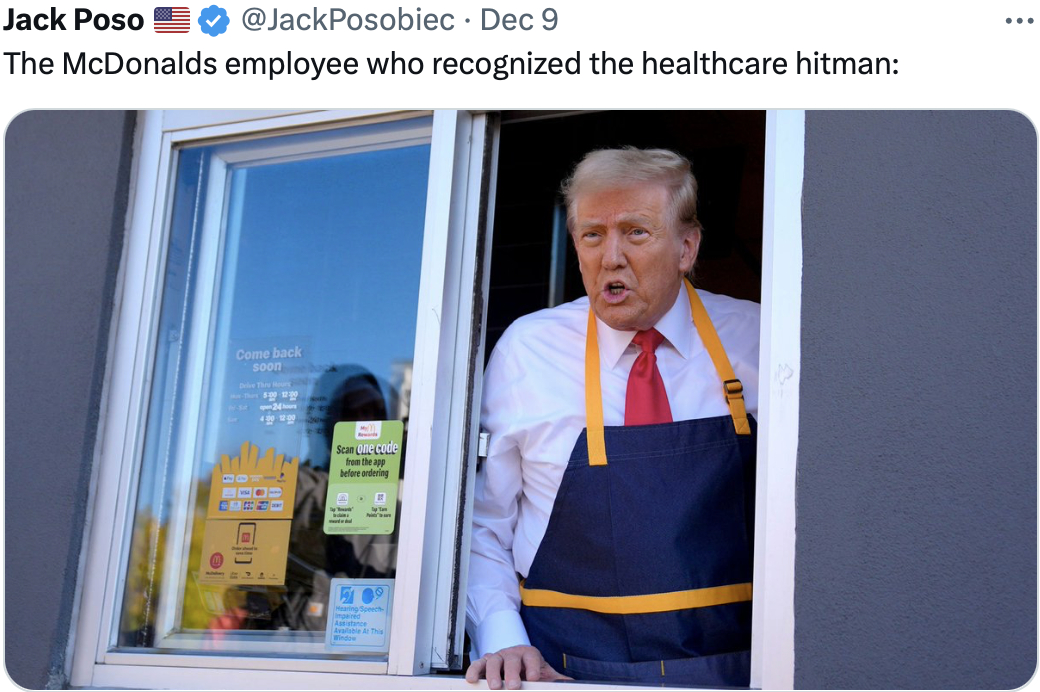McDonald’s is central to American life, both physically and culturally. The last few months have provided two massive news stories that have emphasized this. At the end of October, there was the viral, and controversial, Trump campaign stop, where he “worked” for 30 minutes at a McDonald’s in Pennsylvania. Then, this week, there was the news that Luigi Mangione, the alleged assassin of UnitedHealthcare CEO Brian Thompson, was caught in a McDonald’s—also, coincidentally, in Pennsylvania—because he was spotted by a group of morning regulars and employees.
The reaction to both stories in certain parts of the media has proved that a lot of commentators don’t understand what McDonald’s means to ordinary Americans—which basically means that they don’t understand ordinary Americans, period.
* * * * * * * * *
Trump’s superpower has long been signaling to working stiffs that he’s “just like you,” despite being on the surface nothing like them. His love of McDonald’s, which I believe is as genuine a feeling as any politician can ever have, is one of those signals. In fact, it may be his most effective, because it goads his critics into signaling that they are not “just like you.”
McDonald’s is wildly popular with every group of Americans—urban, rural, male, female, middle or working class; it unites every demographic in the U.S., with a single exception: the highly educated, especially academics. They alone, as a group, seem to have moral issues with McDonald’s, and while they might use it, they do so grudgingly, usually to appease crying kids or for a rest stop on a long trip.
So Trump’s embrace of McDonald’s becomes a political twofer. It shows he’s one of you: He is a back-row guy at heart. But it also shows that while he should be a member of the front-row, given his education and wealth, he’s not, because such people despise him for many of the same reasons they look down on you: for what he eats, how he talks, for what he believes in, and for how he arrives at those beliefs, which isn’t by spending years reading through approved syllabi, but having gone out into the world and learned from it, one mistake after the next.
The press, and his opponents, used the McDonald’s photo op to point out all the obvious absurdities. “The former president, before cosplaying as a successful businessman, was the quintessential elitist,” bleated MSNBC. “So what are MAGA die-hards and faux-centrist Trump apologists talking about when they praise his drive-through stint as ‘amazing and hilarious’?” Obviously, the article didn’t actually pose this question to any normal American, and instead just started quoting statistics.
Criticism like this fell flat because Trump also recognized the absurdities of his stunt, and didn’t care. And anyone who did could be seen, by him and his supporters, as the same old pedantic scolds—people who are so absorbed in their books that they can’t see the real and bigger truths of the world, including the idea that cosplaying as a McDonald’s employee for an hour, especially working the drive-through, is simply fun.
That’s all may be, but curiously enough, Ctrl-F “Kamala” on this Free Press article brings up zero results, when she was the whole reason Trump worked the French Fry machine and the drive-through at McDonald’s for one afternoon: ‘I Did Fries:’ Kamala Harris Claims She Worked at McDonald’s, but She Never Mentioned It Until She Ran for President. Did She Really Toil Beneath the Golden Arches?
As Trump said after his photo op, “I’ve now worked for 15 minutes more than Kamala at McDonald’s.”

